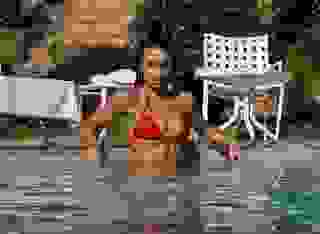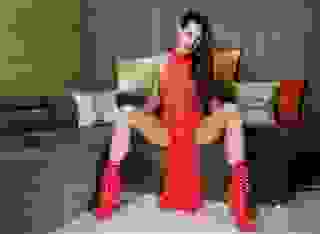- Mature
- Saving Sadie
- Page 3
Note: You can change font size, font face, and turn on dark mode by clicking the "A" icon tab in the Story Info Box.
You can temporarily switch back to a Classic Literotica® experience during our ongoing public Beta testing. Please consider leaving feedback on issues you experience or suggest improvements.
Click hereAnd then Dennis had been the one to go instead of her. Jan felt the guilt, half thought that people thought she had cheated Dennis of his life because she was the one who was supposed to die.
Frank had been companionable, which was where their relationship had started. It wasn't long, though, before Frank had become indispensable. Jan had had another brush with serious illness after she had moved in with Frank, and Frank had been there for her—in ways that Dennis never had—and had stayed by her side. And he had taught Jan to acknowledge her desires and to live her life to the fullest. Which meant that, yes, he was good in bed. And they thoroughly enjoyed each other bed, having given a name to the object they loved sharing.
Jan never did become taken with modern playwrights, though. And the really nice thing with Frank was that this was OK with him. It was only Frank's tendency to plan out Jan's days and evenings for her and to always be at her elbow that had put Jan off. Frank got to the point of finishing Jan's sentences for her, whether she wanted him to or not. It was not only a reminder of how much more quick-witted Frank was, but also marked the drift toward a set marriage, with or without the certificate. Dennis and Jan hit it off well enough when they were younger. It was only when they got to the stage of completing each other's sentences that Jan had gotten restless.
Of course, the way her mind was going now, Jan thought she'd appreciate having someone complete some of her sentences. It would be interesting to know what she had been trying to say. Sometimes that was a mystery to her now. But the habit hit too soon in Jan's relationship with Frank. This had contributed to the slight bobble that the entry of Greg into Jan's life at a vulnerable time had made into a chasm.
In any event, CNN running in the background wasn't Jan's idea of a substitute for either Greg or Frank—but it would have to do.
Jan fed Sadie and ate her own breakfast—more slowly than she should, because she was avoiding what she planned to do this morning. After she finished, she took the dishes to the sink, moved the dirty ones to the countertop, squirted some dish detergent into a dish pan, and turned the spigot on.
It hit her while she was doing this that she wasn't even sure she knew where the city telephone directory was. This was the sort of thing she would have asked Greg about, and Greg would always know where they kept it. Jan padded down the hallway, opening closet doors and looking for the telephone directory. She finally found it on the windowsill in the study, where it was serving a useful purpose of lifting an African violet high enough to catch just the right amount of sun that the finicky plant demanded to flourish.
Apologizing to the plant, she extracted the directory from under it and sat down in her chair in the study, turned the pages to "Retirement Communities," and started perusing the listings. After an hour, she'd marked some, but none of them explicitly stated that they accepted pets, so she knew she'd have to start making some phone calls. Thankfully, a more welcome chore interceded. She remembered that at the burial she'd gotten the idea to check into whether the effect of major events on a writer's life heavily influenced something one of the Romance writers she studied wrote, and she put the telephone directory aside and made some notes on that question and scotch taped them to the side of her desktop computer.
She felt a pang of hunger and walked out into the living area, past the spot where Sadie clung to the floor next to Greg's chair in fitful repose and on in to the kitchen, where she found the water running in the dish pan and overflowing into the sink. Money down the drain.
Jan said a little prayer of thanks that she hadn't put a stopper in the sink, and then cursed herself under her breath. Between this and flooding the street yesterday, her next water bill would skyrocket. She washed the dishes and then took the rest of the lasagna she hadn't eaten last night out of the refrigerator, popped it in the oven, and turned the oven on.
She went back to the study and made three phone calls to the retirement homes that looked the best to her. None of them accepted dogs, but one of them made some suggestions on places that might. They all understood her dilemma and agreed that it was a shame that more places didn't . . . but with the bother and health codes and all . . .
All of this depressed Jan—and tired her out, although she already was pretty washed out from a night with little sleep. She wanted it just to go away. She knew what she needed to do, but nothing was coming easy. She wasn't used to this. This is the kind of thing Greg was good at—and Frank before him. Jan hadn't had to do the tough planning and preparation since she had been married to Dennis—and then only in his declining years. This was part of the attraction of the lifestyle she'd gone to after Dennis had died—someone to take care of her for a change.
Why had Greg gone first? He had promised to always take care of Jan.
Jan didn't want to think about it—she wanted it all to go away. She stood up and walked into the bedroom and laid down on her bed and closed her eyes—wanting all of her problems just to go away, the inevitable future just to evaporate. And she drifted off into sleep.
Jan was dreaming of that day, of the day Greg left her—and she felt close to him. She was moving in her dream toward him and could see his form. The closer she came to him, the more clearly she could see him. She expected him to be beckoning to her, smiling his welcome. But, although nothing was crystal clear to her, she got the impression he was gesturing her away from him—and his made her heart go to lead. Through her dream she heard Sadie whining—that strange little whine that she had used that day Greg died to try to get her attention.
It took Jan a moment to realize she wasn't dreaming at all—that Sadie was there on the bed, standing over her, nudging Jan with her muzzle, and whining that whine. It wasn't a dream.
But Jan couldn't see her all that well. She seemed to be in a haze. A haze of smoke.
Someone was banging on the door. Harold broke through just as Jan, crawling along the floor and coaxing Sadie along with her, reached it.
Chapter Four
"Mom. Thank god we tracked you down—and that you're all right. What happened? How did you get out?"
Ann's voice was nearly hysterical. It was breathy and she was struggling with every word.
Jan was beyond embarrassment. "How did you find out? How did you know?"
"You had our number down for your emergency contact—secondary after Greg. They called, but they only left the number of the hospital they were taking you to and a sketchy explanation of what had happened—that you'd been in a fire. And then that's not the one hospital they took you to. What's the matter? Have you been burned?"
"No, I got out," Jan said. "The lasagna's a little crisp, though. And it was just smoke, not a real fire."
Ann didn't laugh. Jan had meant to try to take an edge off of her daughter-in-law's concern, but it wasn't happening.
"How? How did you manage?"
"Sadie. Sadie woke me up. She saved me." Then it hit Jan. Where was Sadie? Did she make it out OK? If so, where was she now? Suddenly that was all Jan could think of. Where was Sadie?
"Listen, I gotta go," Jan said over the phone line. "I'll call you back. I've got to find out what's happed to Sadie."
"Mom, Mom. Wait a minute. Mom."
Jan was shocked back to attention. That wasn't Ann's voice. That was her son, Rick.
"Rick," Jan said, not knowing what else to say.
"Yes, it's me, Mom. Listen. They said you'd left the stove to burn. You've got to come down here. Now. We've got to talk. And the guy who called us said you aren't going to be going back into your condo any time soon. You need to come down here. We've got to sort this out. We've got to think of something."
Rick was talking to her. Rick was telling her to come down. "OK, Rick. It's nothing serious with me; just took in a little smoke, and they wanted me to come into the hospital to test out my lungs. Anybody can make a mistake like this, can forget to do something. Give me a day or two to see what's up here and I'll come down. But Sadie—"
"There's no place for Sadie there now, either, Mom. Put her in a kennel and come on down."
"I have to find her first." If she's still alive, Jan thought. And it's all my fault, she couldn't help but adding. She wasn't ready to admit it to others yet, but she couldn't hide it from herself.
* * * *
Jan was relieved when she finally tracked down the paramedics who had brought her into the hospital and found out that Sadie had come out of the ordeal fine.
"What? Where?"
"There was a man there; an older gentleman. He said he was a neighbor of yours and that he'd take your dog until you were able to pick him up. He gave the impression that it would be fine with you—that you and he were good friends."
"Her, Sadie's a her," Jan said, a slight tone of indignation in her voice. She didn't know why, but she felt that she needed to speak up for Sadie. She was the only family Sadie had.
When she was released from the hospital, Jan called a cab and made a stop at a hardware store to buy a very nice tool box, and then she went on to her condo.
She only made a cursory inspection, because she was anxious to get to Sadie. The damage didn't look too bad—mainly some repainting, she first thought. And then she got a whiff of the furniture and decided that more would have to happen then just repainting. Maybe she'd have to dump most of it. But then maybe she was going to have to get rid of most of it anyway. She didn't need to have the inevitability written on the wall for her. She'd known even before the fire; she'd started looking into it. Her forgetfulness was getting beyond serious; she had to face the fact that it was clinical. She needed to be under supervised care.
But there was Sadie to think about. She couldn't abandon Sadie. Sadie certainly hadn't abandoned her.
But maybe there was Harold. He had taken Sadie in. Maybe Sadie could go to Harold—and, who knows, he didn't appear to be an irritating man. Jan cringed at the thought, but maybe Harold would be an answer for what she needed now too. Jan knew she was grasping at straws here, though, and she knew this would be a nasty thing to do to Harold. False pretenses. But, then, he was certainly signaling loneliness. Jan tried to dismiss the thought from her mind. When she looked at him, she didn't think sex was likely. Harold seemed like a common sense person. He'd be quick to give her the boot when he discovered why Jan had shown interest in him now.
And boy was Jan right.
Harold met Jan at his door, with Sadie on a leash. He'd probably been watching for her. Only one of the two seemed happy to see Jan. Sadie bounced out of the condo door and was all over Jan in welcome. Jan handed the tool box to Harold, accompanied by an apology and a several words of thanks—for the several things Harold had done, not the least being pounding her door down. Then Jan went down on her knees and returned Sadie's greeting.
Harold stood in the door and watched them, trying to be polite and friendly, but letting his façade slip enough for Jan to know that the excitement she had caused in the neighborhood had also brought out the gossips, who were delighted to fill Harold in on the gruesome arrangements of Jan's life. Loose woman. Cradle robber. Gold digger. Jan had heard them all whispered, although she thought the last one totally unfair, as Jan had always worked and brought in a good income of her own.
"Uh, thanks, Harold," she said. "You're a real lifesaver. Thanks for keeping Sadie for me."
"It's what any neighbor would do," Harold answered. But the way he said it indicated that letting Sadie lay by his door was much more an imposition than screwing a shutter back into the wall or pointing out a needlessly flowing water hose.
"Uh, guess I should be trying to find a roof over our heads for a couple of days—until I can get this all sorted out."
"Yes, I guess that would be a good idea," Harold said. "There are a couple of motels over on Pine. That's where I'd start, if I were you."
"Yeah, you're right. And thanks again."
Jan knew that there wouldn't be any more neighborly help from Harold, and, in the whole, she was relieved, even though this closed one of the only possible doors of what could be done for Sadie. She knew it had been a long shot anyway.
And Jan clung desperately to the need to save Sadie, Somehow, instinctively, Jan knew that this was linked irrevocably with saving herself.
On her third try Jan managed to find a motel that would succumb to her sob story, and would accept a dog. Then she sat by the phone, calling home repair shops, retirement homes, her travel agent, and, when she couldn't avoid it any longer, kennels. All the while Sadie slept contentedly at her feet, assured that Jan would take care of her.
It broke Jan's heart. Jan was getting to the point where she couldn't take care of herself anymore.
Chapter Five
Jan felt so lonely. Sadie wasn't going to talk to her. She might save Jan and give her some companionship, but Jan needed more. She not only needed someone to keep her from burning buildings down around her ears, she also needed someone to talk to—to stimulate what was left of her brain, to help her fight to keep her brain from going to mush. And a little bit of lovin' wouldn't be out of the question either.
Sadie seemed fine where she was—stretched out on the floor between the end of the bed and the console where the TV set was so that she was an immovable barrier to moving around in the motel room.
Jan went to the closet and put on the other set of clothes she'd bought that afternoon, everything else she owned needing a good cleaning to get the smoke out. This other set made her look younger, she thought. It was in brown, and she always liked Greg in brown, although Greg was better looking in blue. Or was it the other way around? No matter, she thought—although it was maddening to be losing memories of Greg this quickly.
She got in the car and drove over to Hudson's, the discrete bar she and Greg had often gone to in the evenings. Greg had always known just the right thing to do in the evening, what both he and Jan would enjoy doing. She sat outside for a while, getting up the courage to go in. She didn't even know why she was here, what he expected. But in the back of her mind, she thought of this as another option she had to check out.
When she walked into the place, several of the patrons there, including the bartender, greeted her warmly and passed on their condolences about Greg. She knew their sorrow was genuine. Greg had always lit up the place. He was the one who made friends easily and knew how to cultivate them and keep them. The conversation had always been lively when Greg was there. Certainly, Jan had been treated well and was always included in the conversations, but Jan always wondered how comfortable she'd be here if Greg wasn't with her—or how comfortable the others would be with her.
Now she got her answer: Not very.
Everyone there was with someone else. And although she was greeted all around, Jan wasn't invited to sit with any of the couples, or foursomes, which were sitting around at the tables. Everyone was already with someone and was happy with drinking and talking with the one they were with.
Jan sat at the bar for a while and had a glass of chardonnay and watched the people enjoying themselves. A young man, maybe in his thirties, came in and was glad-handed and invited to sit at a table with a couple of other patrons. The place was getting nosier with talk—and laughter—all of it being done by someone other than Jan. And then a young woman, looking to be in her late twenties, came in and was greeted and seated the same way.
Then a guy in his fifties came and got "hi's" all around, but no invitation to sit at one of the tables and wound up at the bar, down at the other side of it, from Jan. Jan and he exchanged some looks and then a few lines of chitchat—he was nice enough looking—but then a thirty-something woman came in alone and perched at the bar, and the fifties-something guy turned his full attention in this woman's direction. They too were just chitchatting, though. It didn't really seem like they were flirting—or shopping.
Jan got the message—got more than one message. This wasn't really a pick-up bar. It never had been; that's why she and Greg had been comfortable in the place. Most people came in here already paired and already content with who they were paired with. That was what she and Greg had been. Jan also got the message that she was too old for this. Too old to begin again—and too old for the type of man she gravitated to. She'd known this, of course, but she was looking at all of the options. She had had to check this one out.
She left Hudson's and got in her car and sat there for several minutes. As she sat there, she saw a man with what looked like a familiar face approach and then go into Hudson's. Late forties, maybe early fifties. Nice looking. Jan couldn't place him but somehow thought she should know him. Maybe her memory playing tricks on her again—in either direction, a false positive or a false negative. She had the urge to get out of the car and go back into Hudson's. But she just couldn't do it. She knew it was futile, that she would be acting in desperation and false hope. Like so much else in life, Hudson's had passed her by—just by standing still.
Jan returned to the motel room. Sadie was stretched along the end of the bed now—and she didn't move when Jan undressed, pulled back the covers, laid down, and pulled them back up to her chin. At least there was that. At least there was that much progress, she thought, as she turned out the light and drifted into a peaceful sleep—made peaceful by that simple little gesture of Sadie's and Sadie's gentle snoring, which, if Jan really worked her imagine, she could dream was that of a man in her bed.
The next morning Jan was sitting in the office of a retirement home that had said she could keep Sadie with her. There was nothing attractive about this facility other than that, and they'd only agree to her having Sadie as long as Jan was in independent living—but this was the best that Jan could find. She'd been heartened when she'd approached the facility and saw an old woman sitting and rocking on the front porch with a sleeping and purring cat curled up in her lap. It sounded like the woman was purring too. This would be enough for her, Jan thought. She could close her eyes to the rest. Having Sadie beside her would be enough. And, with luck, Sadie would go before her and she wouldn't have to worry about who would take care of the dog. Her going about ten minutes after Sadie did would suit Jan fine.
What Jan couldn't count on, realistically, though, was Sadie going before Jan had to move from independent to assisted living. Her father had had Alzheimer's. Jan had to acknowledge that she feared that was her road as well—and that the drive there was faster than she possibility could hope.
But it was a stopgap. There was an outside chance there would be something down where Rick and Ann lived. But Jan didn't want to do that. She didn't want to impose herself on them now. Maybe earlier when she could pull her own weight and didn't promise to be so much of a burden. But she would see. She'd fly down there for a few days and see. Sadie would have to put up with a kennel for a few days, sad to say.
From this point Jan—and Sadie too—would have to live from day to day, trying to make the best of it. They only had each other.
Chapter Six








